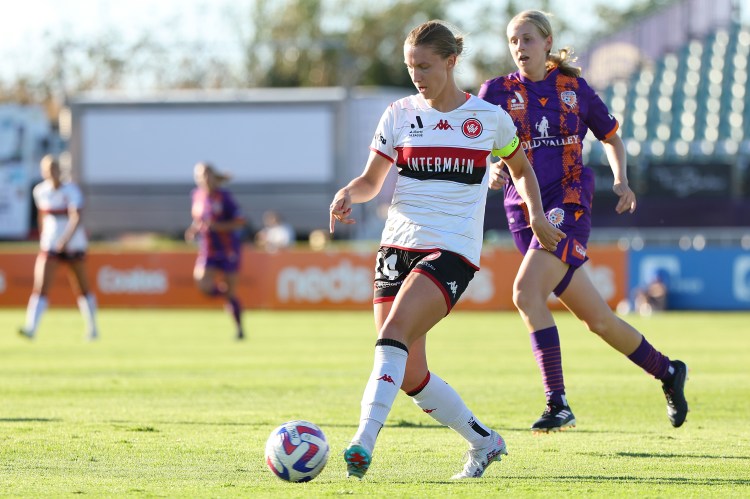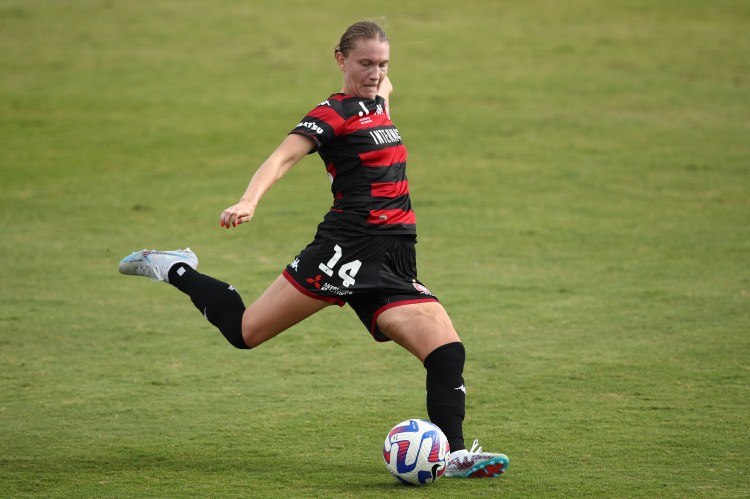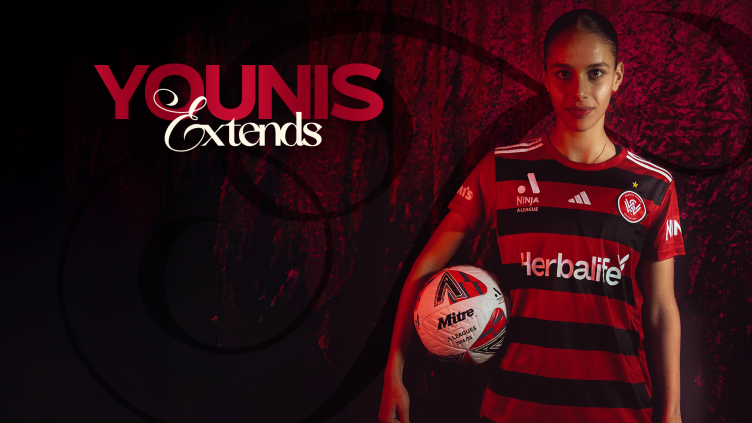Wanderers captain seemingly came from nowhere, but World Cup chance has been years in the making writes Tom Smithies.
It’s the poise that is most striking about Clare Hunt, whether it’s guiding Spain’s glamorous attack away from the Australian goal or fielding a stream of questions from a tableful of journalists.
Somewhere along the line, whether it was a cruelly debilitating run of injuries for five years from her late teens, or growing up on a farm, or even just observing her parents, Hunt has learnt not to get too flustered.
It’s one of the reasons why a 24-year-old defender with fewer than 50 games of professional football is heading for a starting spot at the World Cup, in front of 80,000 people and with the rest of the country likely to be watching on TV.
But no, even that prospect doesn’t shake the sangfroid of Western Sydney’s captain, who less than six months ago assumed that the only way she’d be at the World Cup was if she bought some tickets.
Maybe everything is a bonus, after the endurance needed to overcome so many setbacks, enough to make someone more superstitious wonder if they were cursed.

Soon after she had earned a W-League contract with Canberra United in 2017 and a call-up to the Young Matildas – plus a scholarship to Sydney University – Hunt ruptured her anterior cruciate ligament (ACL) requiring surgery. Three further consecutive operations were then needed to correct issues with her other knee, she dislocated her shoulder and had a full reconstruction, and finally fractured her tibia.
That’s why she has played so few games for someone of her age – but those injuries explain so much else. “Suffering an injury like that when you’re 17 is difficult because the world is at your feet – you’re 17, playing A-Leagues and you know that you want to pursue professional football,” Hunt tells KEEPUP.
“The dream becomes more real when you’re in circumstances like that and you recognize your potential when you’re surrounded by players who are internationals. You learn from them and you grow from them and you see what they’ve done with their careers, you want to do that with your career.
“So having my ACL rupture, I found that exceptionally difficult purely because my whole life had been driven towards wanting to be a professional footballer.
“Obviously, I did value education at the time and Mum drove that into me because she’s an educator as well. But I felt like I knew that that’s what I wanted to do.

“So this was a big wake-up call in terms of, this is going to be a difficult path for you if this is what you choose – but hey, it’s 12 months, I just need to do this rehab as best I possibly can to give myself the best opportunity to return to play.
“Now that I reflect on it, it’s a fairly mature mindset for a 17-year-old to have, but I never expected it to go for what was almost five years, with dribs and drabs of playing football in between that.”
The key, according to guiding figures along the way such as former Matilda Heather Garriock, is that Hunt’s commitment to recovery never flagged.
“I think I became really motivated by the rehab and I knew that if I showed up every day and consciously gave 100% then I wouldn’t be left short,” Hunt says.
“I wanted to know that I gave professional football the best shot and I gave rehab the best shot for five years.
“Now that I’m playing and enjoying playing, it’s the people that take you through that (journey). For me that was my mum and dad, and I have some really, really close friends that are within football and other friends that I’ve met outside football through university and stuff like that.
“I think now I’m just proud that I get to stand here and represent those people when I do play because I know without them, I wouldn’t have been as resilient. I wouldn’t have been as measured. I wouldn’t have been as motivated as I am now without them there.”

Her parents’ investment has been absolute, from the point as a small child that she showed promise. Her father would rise in the early hours to complete his work on the family farm five hours west of Sydney, so that he and his wife – at the end of her day teaching – were free to drive their children to sporting commitments as far afield as Sydney and Canberra.
“I feel such a connection to family and I think that’s something that has really helped me in terms of my football,” Hunt says.
“Dad obviously was and is very, very calm, same with mum. I feel like they have brought me up in what is a fairly serene and low key childhood and environment, growing up on a farm and having humble beginnings.
“Being with them through that whole process and the difficulty that comes with staying at home up until 17, and traveling enormous hours with mum and dad in the car, you have a sense of connection with them that I think I would have lost had I moved away from home or not pursued football in the way that I did.
“I have had them the whole way through and they understand the story, they understand the journey and they understand the difficulty and hardship that comes with that.
“Knowing that I feel understood in what I went through and also what I can now experience, it’s pretty special to share that with the people that sacrifice so much for you.”
That connection won’t extend to Hunt taking over the farm – “definitely not and I think mum and dad are so ok with me not doing it!” – especially not given her rise in stature since a surprise call-up to the Matildas squad for the Cup of Nations in February.
In training and then in games, especially a starting debut against Spain, Hunt showed nothing but that poise again.
“I’m glad that I got to experience a maturing growth through I’d say the last five or six years,” Hunt says. “I played minimal football but I think I learned along the way how to deal with difficult situations or how to prepare myself best for a match or even just for an environment that I’m uncomfortable in.
“Because for five years you’re in an uncomfortable situation when all you want to do is play football and you can’t.
“So I felt that when I went into that (Matildas) environment, it wasn’t easy, but it was easier than stuff I had experienced through my injury battle. For me, it was more of a reward rather than a difficulty, so to speak.
“I think I was probably nervous thinking about going into camp, But once I got in there, got to introduce myself to the girls and just be in the environment as me, I started to feel comfortable with the team and with myself and all the pressure and nervousness kind of left.
“I felt like I was meant to be there and when I started to play, I felt immense support with the players that I had around me.

“I went in with the mindset that I’m playing with 10 other players on the park who are exceptional footballers. So I didn’t feel pressure to perform.”
Tony Gustavsson will count on that detachment continuing into the World Cup, even as the expectation of millions of fans becomes clear.
“I haven’t delved into that as much as I probably could have and I think that’s also a good thing that I’m not going, ‘This is an enormous opportunity, this is a once in a lifetime opportunity’,” laughs Hunt.
“I accept that that is the case, but I don’t want to get myself carried away in the sense that like this is probably a greater pressure situation purely because it’s on home soil.”
In any case she has more pressing concerns – like a daily battle with one of the world’s greatest players at training. Few opponents will carry the cache of marking Sam Kerr.
“If you’re marking one of the best strikers in the world, then I suppose that’s the best it can get for you in a training environment,” Hunt says.
“I learn a lot more playing against her. I see where I need to get better a lot quicker playing against her.
“I just see it as a wonderful opportunity to get better. It’s given me a bit of confidence to know that I can hold myself and hold my own at this level.
“Once you have a little bit of confidence there, then you can start to build on what you need to and recognize where your strengths are, where your weaknesses are and use the players around you to guide you through that.
“I’m also surrounded by some of the most experienced defenders on the planet. So it’s pretty amazing to come to training every day and, and learn from them and grow from them.”




